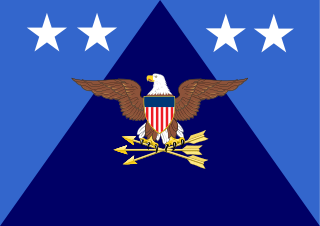
The chief of naval operations (CNO) is the professional head of the United States Navy. The position is a statutory office held by an admiral who is a military adviser and deputy to the secretary of the Navy. In a separate capacity as a member of the Joint Chiefs of Staff, the CNO is a military adviser to the National Security Council, the Homeland Security Council, the secretary of defense, and the president. The current chief of naval operations is Admiral Michael M. Gilday.

The secretary of the Navy is a statutory officer and the head of the Department of the Navy, a military department within the United States Department of Defense.

The United States secretary of health and human services is the head of the United States Department of Health and Human Services, and serves as the principal advisor to the president of the United States on all health matters. The secretary is a member of the United States Cabinet. The office was formerly Secretary of Health, Education, and Welfare. In 1980, the Department of Health, Education, and Welfare was renamed the Department of Health and Human Services, and its education functions and Rehabilitation Services Administration were transferred to the new United States Department of Education. Patricia Roberts Harris headed the department before and after it was renamed.

The president pro tempore of the United States Senate is the second-highest-ranking official of the United States Senate. Article One, Section Three of the United States Constitution provides that the vice president of the United States is the president of the Senate, and mandates that the Senate must choose a president pro tempore to act in the vice president's absence. Unlike the vice president, the president pro tempore is an elected member of the Senate, able to speak or vote on any issue. Selected by the Senate at large, usually by a resolution which is adopted by unanimous consent without a formal vote, the president pro tempore has enjoyed many privileges and some limited powers. During the vice president's absence, the president pro tempore is empowered to preside over Senate sessions. Except when necessary or to highlight important votes, the vice president and the president pro tempore rarely preside; instead, the duty of presiding officer is rotated among junior U.S. senators of the majority party to give them experience in parliamentary procedure.

The Michigan House of Representatives is the lower house of the Michigan Legislature. There are 110 members, each of whom is elected from constituencies having approximately 77,000 to 91,000 residents, based on population figures from the 2010 U.S. Census. Its composition, powers and duties are established in Article IV of the Michigan Constitution.

The secretary of the Senate is an officer of the United States Senate. The secretary supervises an extensive array of offices and services to expedite the day-to-day operations of that body. The office is somewhat analogous to that of the clerk of the United States House of Representatives.

The United States Department of the Army (DA) is one of the three military departments within the Department of Defense of the U.S. The Department of the Army is the federal government agency within which the United States Army (U.S.) is organized, and it is led by the secretary of the Army, who has statutory authority under 10 United States Code § 3013 to conduct its affairs and to prescribe regulations for its government, subject to the limits of the law, and the directions of the secretary of defense and the president.

The vice chief of naval operations (VCNO) is the second highest-ranking commissioned United States Navy officer in the Department of the Navy and functions as the principal deputy of the chief of naval operations and by statute, the vice chief is appointed as a four-star admiral.
The Chief Clerk, between 1789 and 1853, was the second-ranking official within the United States Department of State, known as the Department of Foreign Affairs before September 5, 1789. Section 2 of the Act of Congress of July 27, 1789 establishing a Department of Foreign Affairs, authorized the Secretary to appoint a Chief Clerk, who would have custody of the Department's records whenever the office of the Secretary should be vacant. From 1789 to 1853, when Congress created the position of Assistant Secretary of State, the Chief Clerk was the second-ranking officer of the Department of State, and was responsible for supervision of Department personnel, distribution of correspondence, and day-to-day operations.

The under secretary of defense for personnel and readiness, or USD (P&R) is a high-ranking civilian position in the Office of the Secretary of Defense (OSD) within the United States Department of Defense responsible for advising the secretary and deputy secretary of defense on recruitment, career development, pay and benefits, and oversight of the state of military readiness. The under secretary is appointed from civilian life by the president and confirmed by the Senate to serve at the pleasure of the President.
The Presiding Officer of the United States Senate is the person who presides over the United States Senate and is charged with maintaining order and decorum, recognizing members to speak, and interpreting the Senate's rules, practices, and precedents. Senate presiding officer is a role, not an actual office. The actual role is usually performed by one of three officials: the Vice President; an elected United States Senator; or, in special cases, the Chief Justice. Outside the constitutionally mandated roles, the actual appointment of a person to do the job of presiding over the Senate as a body is governed by Rule I of the Standing Rules.

The Assistant Secretary of the Air Force (SAF/AQ) is a civilian position in the Department of the Air Force that is appointed by the President of the United States and confirmed by the United States Senate. This position is established under Title 10 US Code Section 9016 and is one of five Assistant Secretary positions under the Secretary of the Air Force. The Assistant Secretary reports to the Secretary of the Air Force.

The Under Secretary of Homeland Security for Intelligence and Analysis is a high-level civilian official in the United States Department of Homeland Security. The Under Secretary, as head of the Office of Intelligence and Analysis at DHS, is the principal staff assistant and adviser to the Secretary of Homeland Security and the Deputy Secretary of Homeland Security for fusing law enforcement and intelligence information relating to terrorism and other critical threats.

The Office of the Administrative Assistant to the Secretary of the Army (OAA) has a primary mission, as specified in Title 10 of the United States Code and reiterated in General Orders and Regulations, to provide direct support to the Secretary of the Army, the Under Secretary of the Army and other Army presidential appointees. In accordance with Army Regulation (AR) 25–59, OAA's office symbol is SAAA.

The Federal Vacancies Reform Act of 1998 is a United States federal statute establishing the procedure for filling vacancies in an appointed office of an executive agency of the government before the appointment of a permanent replacement.

The Assistant Secretary of Commerce for Legislative and Intergovernmental Affairs is the Department of Commerce's principal liaison to the U.S. Congress, state governors, and other state officials. The officeholder heads the Department of Commerce Office of Legislative and Intergovernmental Affairs (OLIA). The position is currently held by Michael Platt Jr.

The Chief Financial Officer and Assistant Secretary for Administration of the United States Department of Commerce oversees management matters in the Commerce Department, including financial resources, human resources, and facilities. The Assistant Secretary establishes and monitors implementation of Departmental administrative policies, including budget and financial management, strategic planning and performance management, human resources management and civil rights, employee safety and health, procurement, grants management, travel and transportation of household goods, real property and facilities management, directives management, and security. He coordinates implementation of government-wide and Departmental management initiatives. Performance of functions related to the position of Chief Financial Officer are as required per the Chief Financial Officers Act of 1990. The Assistant Secretary is also responsible for the management of the Department of Commerce headquarters in the Herbert C. Hoover Building in Washington, D.C. The office is currently held by Ellen Herbst.














